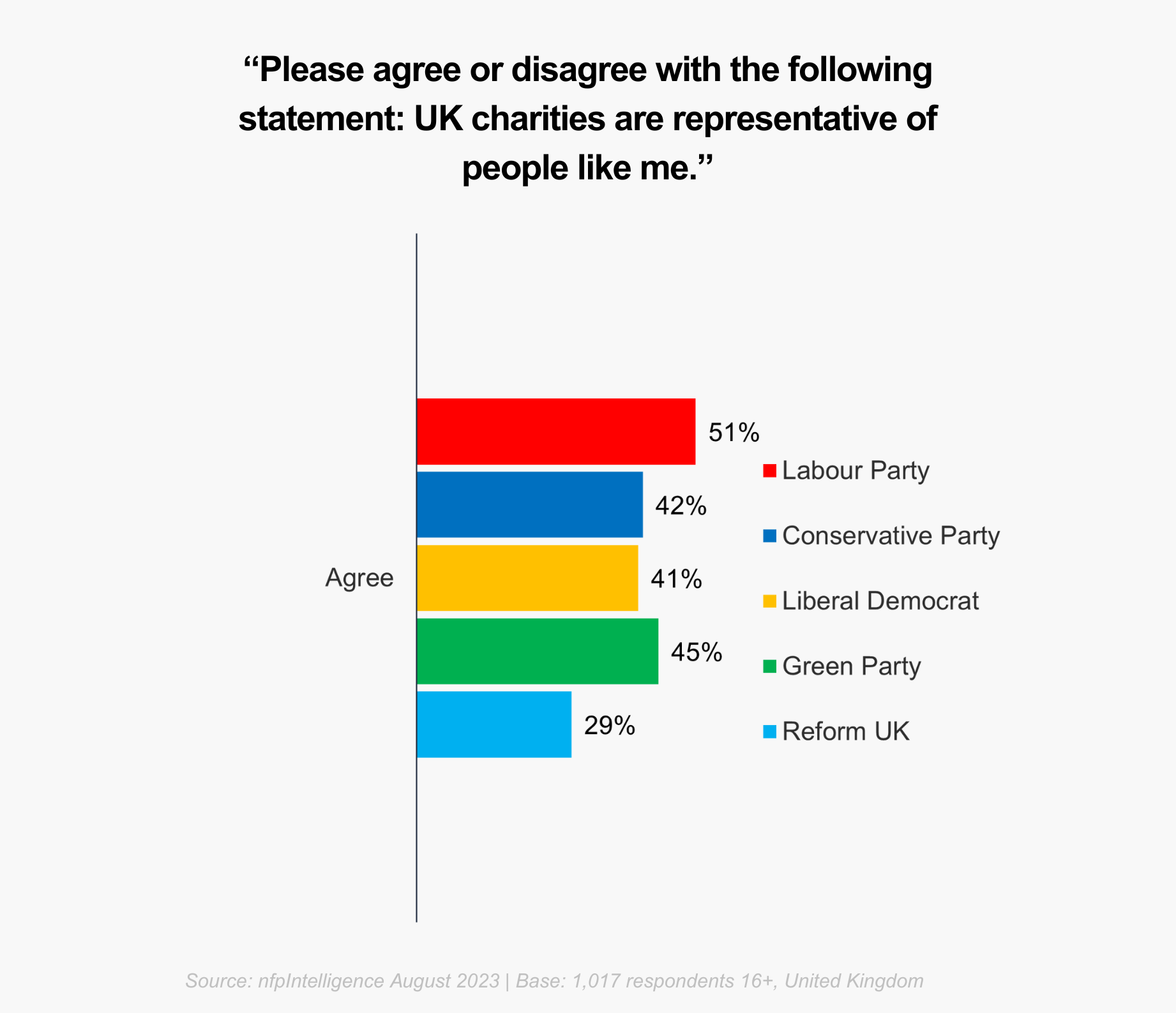Tim Harrison-Byrne
Reform UK’s success in last week’s local elections was a surprise to even the most seasoned political commentators. The party won 31% of the vote in the seats that were up for grabs. Sir John Curtice said on the BBC that ‘Reform’s triumph was much more than a protest vote’, with Reform ‘winning most votes, most seats and overall control of most councils’. It’s early days, but it looks like Reform UK is becoming a far more popular and politically potent party than its predecessors - UKIP and the Brexit Party - and is appealing to a broader and greater number of voters.
At nfpResearch, we want to know how current trends are impacting charities. So what we do we know about Reform voters? And what do they think about charities?
1. Only 49% of Reform voters say they trust charities
Reform voters have very low levels of trust in many UK institutions, and charities are no exception. In March 2025, 62% of the UK public said they trust charities, whereas this figure falls to only 49% for Reform voters. The only institutions Reform voters are more likely to trust than the national average are the Armed Forces and the Royal family – organisations that are often perceived as embodying traditional British values. This suggests that for many Reform voters, trust is tied to a sense of patriotism and history.
2. Reform voters don’t believe UK charities are representative of them
Many Reform voters feel culturally and politically alienated, and this extends to their perceptions of the charity sector. Our research finds that Reform voters are significantly less likely to feel that charities ‘are representative of people like me.’
This sentiment could be linked to the political positioning of some high-profile charities, which are often perceived (fairly or not) as aligning with more progressive causes. For Reform voters, many of whom express frustration with “woke” politics or metropolitan elites, charities can seem out of touch or aligned with values they don’t share.

3. 60% of Reform voters have given to charity in the last 3 months
In spite of lower levels of trust and feeling underrepresented, most Reform voters do give to charity. In March 2025, 60% of Reform voters reported having given to charity in the previous three months, just slightly below the UK average of 66%.
However, the average donation amount is also lower among Reform voters. This suggests that while their engagement with charities is still relatively high, it may be more transactional or reserved than that of the broader public.
4. Significantly higher support for military charities
One area where Reform voters are especially engaged is with military charities. Support for causes related to veterans, the Armed Forces, and remembrance is significantly higher among this group than the national average.
This aligns with the earlier point about trust; military charities are seen as supporting British values, honouring service, and helping those who have given to the nation. These are resonant themes for Reform supporters, and offer an important route for engagement.
How much of this is a Reform effect—and how much is about demographics?
These findings are interesting and clearly highlight a difference in the attitudes of Reform voters compared to voters from other parties of the public overall. But how much of these attitudes are unique to Reform UK? And how much simply reflect the characteristics of the party’s voter base?
Reform voters tend to be older, more likely to be male, and more likely to live in non-metropolitan or economically marginalised areas. All of these factors correlate with lower trust in charities and less engagement with progressive causes. In that sense, Reform may not be shaping these attitudes so much as giving political voice to people who already felt this way.
That said, the party’s rise gives new prominence to these views—and potentially a larger audience for narratives that see charities as politically biased or culturally distant. For the charity sector, that makes it all the more important to understand and, where appropriate, bridge these divides. Reform voters are not anti-charity; they give, they care, and they engage. But they want to see organisations that feel grounded in their values and communities.
nfpIntelligence research is included as standard for all nfpPublic UK subscribers. For more information on this research, download more information below, or get in touch at insight@nfpresearch.com today.

